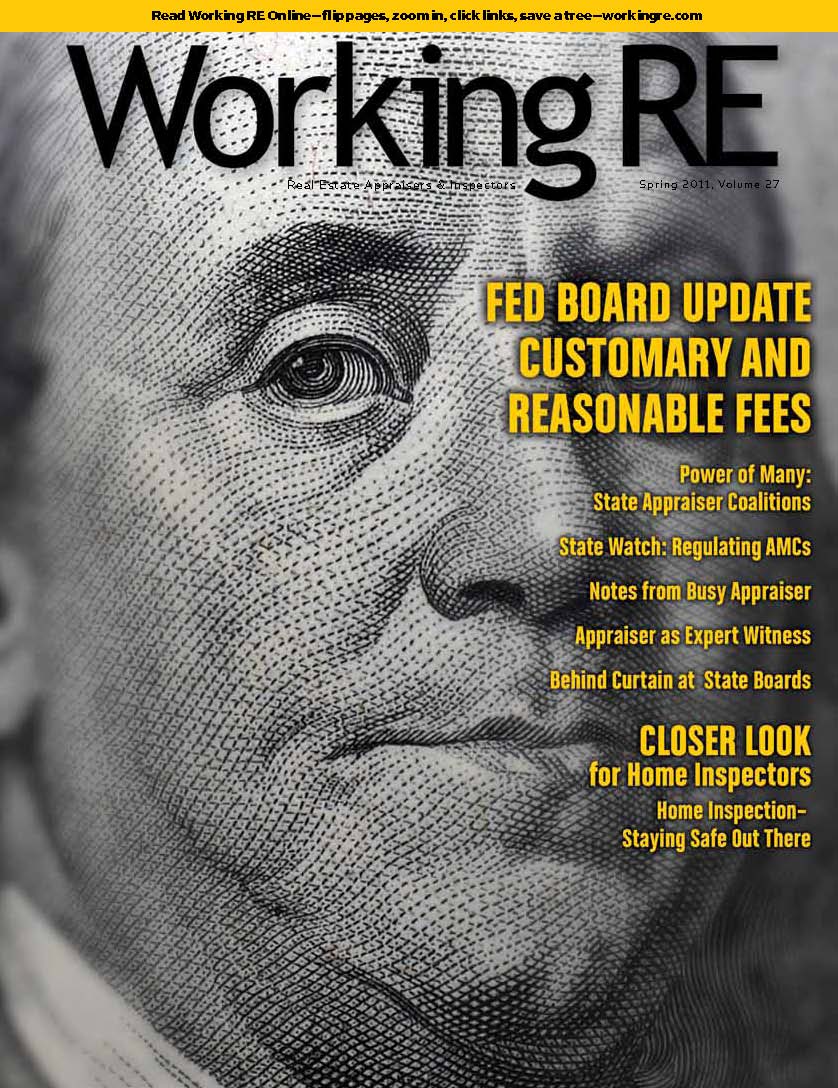
|
Published by OREP, E&O Insurance Experts | Sept. 28, 2011 | Vol. 233 |

|
> Surveys
> Blogs
> Leave Comments Below |
"Since violation of a state’s appraiser certification law is not a crime, the protection of our Federal Constitution- “innocent until proven guilty,” does not apply."
Editor’s
Note:
What you
don’t know about how state boards handle enforcement issues may surprise
you. This story is taken from the current issue of Working RE Magazine
(click image above to read entire issue).
Understanding State Board
Enforcement
By Timothy C Andersen, MAI
Like most real estate appraisal boards, Florida’s Board publishes an annual summary of the cases it finalizes against its appraisers. Florida’s Real Estate Appraisal Board (FREAB) does not intend these summaries to be lengthy analyses of “what went wrong” or something law students might study for insight. They are merely summaries of the charges the state brings against appraisers, why they bring them and the outcomes, as the state’s sunshine law requires.
The website is public record, listing names, dates, certification numbers and so
forth, as is common in most states (click
to view). We have included summaries here with appraiser names redacted.
What is important is not the respondents’ names but the charges
laid against them, as well as the charges that are not. This issue is important
to all appraisers no matter where they live.
Guilty until Proven Innocent
It is interesting to note that to violate a state’s appraiser certification
law is not a crime, per se. It is not illegal, either, which means it is not
“breaking the law.” It is unlawful, however, which means to do something
in a manner the law does not authorize. Since violation of a state’s appraiser
certification law is not a crime, the protection of our Federal Constitution-
“innocent until proven guilty,” does not apply. When the state sends a
letter it informs you that you are guilty of a violation of USPAP and/or
state law. There are no hearings, no trial, no judge, no jury. You are guilty.
You can defend yourself and the state may even drop some of the
charges. However, you are guilty of something for no other
reason than the state says you are.
Failure to Exercise Reasonable Diligence
In the state of Florida, an omnibus charge leveled no matter what an appraiser
does or fails to do, is that he or she “failed to exercise reasonable diligence”
in performing that appraisal. Most states have a similar omnibus charge. It is
also interesting to note the state of Florida does not, in its appraisal statute
(FS 475, part 2) nor in its administrative code (FAC 61J1), define, explain, or
elaborate on what the exercise of reasonable diligence means, how the
state applies it, when the state may choose to apply it or what constitutes such
a failure. Despite this lack of elaboration, the state of Florida chooses to
level this charge frequently. Inspection of the 2010 Disciplinary Activity
Report shows that of the 144 disciplinary actions listed, 96 (67
percent) specifically contain this charge. It is equally interesting to note
that any of an appraiser’s omissions or commissions can result in this
tacked on charge.
Consider Case #20080608591 (names redacted). Here, the state charges the
appraiser with violation of the Departure Rule, as well as with “failure
to exercise reasonable diligence,” whereby one charge becomes two. In Case
#2009017685, the respondent’s workfile failed to contain “[the] documentation to
support the adjustments and conclusions in the Sales Comparison and Cost
Approach sections of the report,” which is by definition also a “failure
to exercise reasonable diligence.” Again, one violation becomes two by an action
no more complex that the stroke of a pen. In Case #2008047867, “failure to
exercise reasonable diligence” includes a misstatement of the subject’s zoning
(as if merely misstating the zoning was not enough, in and of itself, to justify
a charge).
Case #2009007431 illustrates the problem of charging an appraiser with “failure to exercise reasonable diligence”; the charge reads: “Respondent failed to reconcile the sales contract price of the Subject property with the opinion of value in the report. Respondent also had the incorrect depreciation amounts in [sic] the Cost Approach section of the report. Respondent’s work file [sic] lacked documentation to support the adjustments made in the Sales Comparison approach section of the report. Violation: guilty of having failed to exercise reasonable diligence in developing an appraisal report”; two charges become three.
What is interesting is the state’s using “failure to exercise reasonable diligence” to convert an appraiser’s benign action, which is not a violation of statute or the Uniform Standards of Professional Practice (USPAP), into a malignant violation. For example, USPAP does not require the appraiser to “reconcile the sales contract price...with the opinion of value in the report” as the charge states. SR1-6, the reconciliation standard, puts reconciliation in the context of “data available and analyzed within the approaches used” and “the applicability of the approaches, methods and techniques used.” Clearly, if there is a sales contract, the appraiser should analyze it and explain why the final value opinion and the contract price vary (if they do). Nevertheless, USPAP does not specifically mention such reconciliation nor does Florida state statute. Yet with this added charge applied, the appraiser’s failure to take a step USPAP does not even require, this “violation,” is elevated to the same level as a violation of USPAP’s Ethics Rule.
Inspection of the other cases the state closed in 2010 show that Florida equates “failure to exercise reasonable diligence” with numerous other violations, in addition to those this essay treats specifically. These additions are as diverse as improperly maintaining a workfile and/or failure to have within the workfile documentation of the derivation of adjustments2. The state also includes under this tent, the failure to include and/or calculate depreciation properly, as well as failure to reconcile discrepancies in data. This tent even includes a charge that the appraiser certified he completed the appraisal in compliance with USPAP, even though the state concluded this was not true.
By contrast, were there any 2010 cases in which the appraiser did not "[fail] to
exercise reasonable diligence”? In Case #2008052576, the charges against the
appraiser state, “in June 2007, Respondent (name redacted) appraised a property
in Apopka…relying exclusively on the developer’s sales office for data on the
Subject Property [sic] and one Comparable Sale [sic], misstated the sales price
for that Comparable Sale [sic] and failed to maintain in the workfile a fully
executed copy of the sales contract for the Subject Property [sic].” Despite
these omissions and commissions that prima facie seem as egregious as the
others (supra), the state did not charge the appraiser with “failure to
exercise reasonable diligence” in the preparation of that appraisal and report.
Therefore, if an appraiser were to conclude that the state is not consistent in
its charges and judgments, that conclusion would be difficult to refute from the
data in the record. The state, as you might guess, is under no legal obligation
to charge and judge equitably.
Implications
If the state of Florida is a bellwether, and in matters such as these it
usually is, it looks as if the states may be willing to negotiate away X-percent
of the original set of charges against an appraiser but that the umbrella charge
of “failure to exercise reasonable diligence” or something similar remains, even
if there is only one substantive charge. While this term is clearly as ambiguous
as the term “moral turpitude,” this is not enough to extinguish its use against
appraisers by the states. What is at stake? When an E&O provider sees that an
appraiser has been charged with “failure to exercise reasonable diligence,” red
flags will go up and in some cases so will the appraiser’s E&O premium, even
though the failure may have been a single one of a minor nature, requiring but a
small state penalty.
Also, if states do not uniformly apply the “failure to exercise reasonable
diligence” charge, it leaves appraisers wondering under what circumstances
failure to maintain a workfile properly is “failure to exercise reasonable
diligence” and when such an omission is not. The appraiser has the burden of
understanding his or her state statutes and administrative codes relative to
real estate appraisal, their limitations on appraisers and how and when those
limitations apply. Failure to understand the law will not protect appraisers
from it.
Enforcement Across States
A common complaint is that USPAP is not enforced uniformly by the states.
According to a recent story in Working RE (visit WorkingRE.com, Didn't Make it
to Print; The Appraisal Foundation Raising the Bar), the Appraisal
Foundations (TAF) has the uniform enforcement of USPAP by the states on is
priority list. The problem, however, is that each state is sovereign in the
creation and enforcement of its laws, so the complaint of unequal enforcement is
both true and irrelevant. While it is the appraiser’s job to conform
him/herself to the law of the state(s) granting certification, it is not the job
of the states to conform themselves to what other states are doing.
The following is a true story: an appraiser certified in both states X and Y
recently shared an anecdote about the lack of uniform enforcement between the
two states in which he works. State X charged him with various violations and
applied a sanction. Since most states have, as part of their certification law,
verbiage that discipline in one state can trigger discipline in another state as
well, this appraiser told the authorities in state Y of the sanction by state
X. The authorities in state Y asked him to send in the charges, etc. from state
X. He complied knowing full well that it could result in his being sanctioned in
state Y also. After looking at the case, the certification officials in state Y
told this appraiser that not only were they not charging him with any
violation, but that their state would never have even opened a file given the
evidence. So what got him charged and sanctioned in one state was innocuous to
another.
Another case (details in author’s possession) shows a western state sanctioning a residential appraiser for violation of the COMPETENCY RULE. In the offending appraisal report the appraiser disclosed s/he was “not a home inspector and only performed [sic] a visual inspection of the site and this appraisal cannot be relied upon to disclose conditions and or defects in the property.” This is a common disclosure many appraisers use daily so their clients and intended report users more completely understand the scope of what an appraiser does and cannot do as part of an appraisal.
A Stipulation and Consent Order is a document where both parties involved (state
and respondent) agree to all the material and statements in the order and which
binds them both to its stipulations and conditions. The Order in this case
states that the “[r]espondent [also] failed to disclose this lack of competency
prior to acceptance of the assignment.” In other words, in this western state,
an appraiser must also be a competent home inspector in order to be a competent
real estate appraiser, according to the stipulation and consent in this Order.
In another Stipulation and Consent order from the same state, its certification
authorities found that the appraiser violated the ETHICS RULE. Here is the
quote from the Order: “The original client was (Bank X) but this was changed to
(Bank Y) by altering the statement of the intended user of the report without
full disclosure of the original client or why a new user appeared, which is
misleading.” The key is the phrase “without full disclosure of the original
client.” If one looks over the ETHICS RULE one does not find anywhere any
requirement that the appraiser must disclose who the client was on a previous
appraisal assignment. Yet, by signing the Stipulation and Consent Order, this
appraiser agrees that such a failure to disclose is a USPAP violation. Indeed,
had the appraiser so disclosed, that would likely have violated the
Confidentiality provision of this RULE! Thus, the state made the appraiser
stipulate to an admission of breaking a rule that does not exist, as well as
consent to a sanction for so doing.
One more anecdote is in order, this from a metropolitan southern state. To
quote the state, the appraiser “[v]iolated USPAP by misreporting a date signed
on an appraisal and failing to maintain a copy of all communicated appraisal
reports within the workfile.” The problem is that USPAP does not require
an appraiser to maintain copies of all communicated appraisal reports within the
workfile. USPAP merely requires appraisers to retain such copies. USPAP
does not state where those copies must be retained nor does it make an issue of
the medium on or by which the appraiser retains them. The appraiser merely must
have them and be able to access them when and if the need arrives. For failing
to do what USPAP does not require appraisers to do, this appraiser
received a $750 civil penalty, as well as the requirements to take a 15-hour
Site Valuation and Cost Approach course and a course in Residential
Report Writing. Interesting sanctions for violating a rule that does not
exist, aren’t they?
Summary
The summaries here, which are not meant to be a scientific sampling of
anything, show that the states are enforcing USPAP on a level more sophisticated
and imaginative than most appraisers might expect. Since the only appeal to
these state decisions is via the time-consuming and expensive circuit court, it
behooves appraisers to be aware of these decisions and conform themselves to
them. It is likely not necessary to maintain a five-inch pile of paper in a
manila folder for every appraisal assignment that comes in the door. However,
having one CD for every report, with copies of every scrap of paper the
appraiser generated during the production of the report, is likely the only
acceptable response to state actions such as these. The CDs must be kept in a
safe, easily acceptable place. In addition, the appraiser must have the
technology to reduce all of the contents of that CD to paper easily, should that
be necessary.
As for the states, don’t stand on one foot waiting for any changes from them. The Appraisal Sub Committee and The Appraisal Foundation look to the states to enforce their individual appraisal statutes in a timely and vigorous way. States are lauded for bringing charges against their appraisers and then clearing those charges from their books ASAP. Because of the states’ essentially unassailable power to sanction and punish, state Boards must do a better job distinguishing between those circumstances that require serious sanction and those where education and counsel are more suitable.
1This State charged the appraiser with the violation in 2008, but the violation took place in 2006 when the Departure Rule was still in effect.
2This, despite the fact that USPAP does not require the appraiser to adjust anything for any reason. Indeed, Standards One and Two do not even mention the word “adjustment” in any context. The words “adjustment” and “adjustments” do not appear until AO-16.
HTML Comment Box is loading comments...
ATTENTION: You are receiving WRE Online News because you opted in at WorkingRE.com or purchased E&O insurance from OREP. WRE Online News Edition provides news-oriented content twice a month. The content for WRE Special Offer Editions is provided by paid sponsors. If you no longer wish to receive these emails from Working RE, please use the link found at the bottom of this newsletter to be removed from our mailing list.



